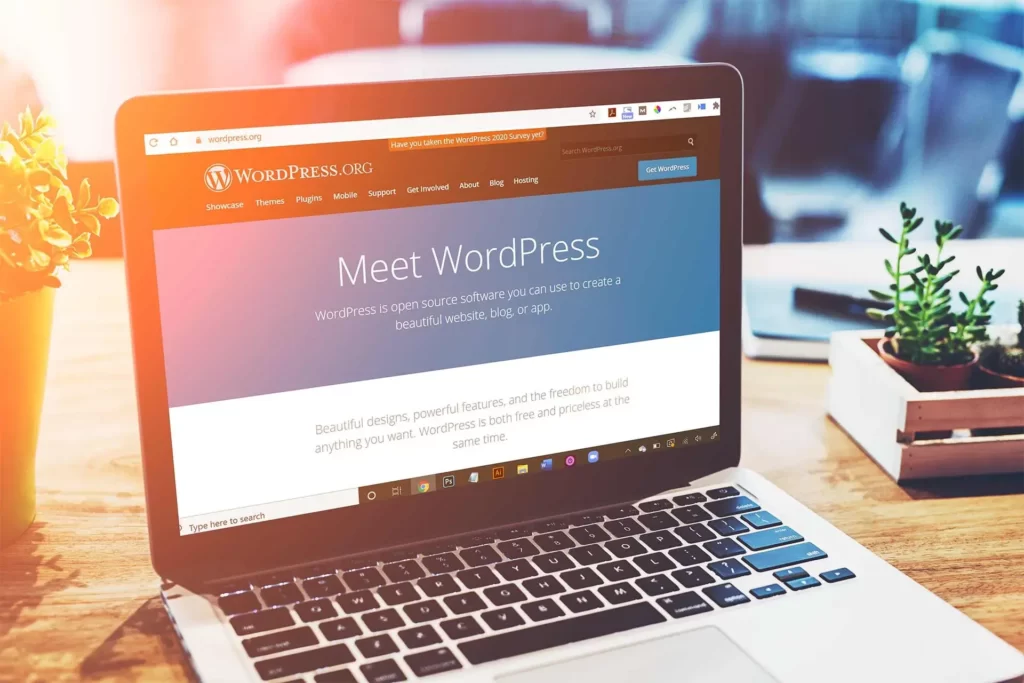There are many options on the market, but today we are going to compare three of the most popular: WordPress, Wix and Shopify. Each one has its advantages and disadvantages, so let’s look at them in detail so you can decide which one best suits your needs and goals.

WordPress
It is the most used content management system (CMS) in the world, with a market share of more than 40%. It is open source software that allows you to create and customize all types of websites, from blogs to online stores. Some of the advantages are:
- It’s free and easy to install on your own domain and hosting.
- It has a large community of developers and users who offer support, tutorials and resources.
- It has thousands of themes and plugins to expand the functionality and design of your website.
- It is very flexible and scalable, you can adapt it to any type of project and make it grow according to your needs.
- It is compatible with SEO and allows you to optimize your website for search engines.
However, it also has some drawbacks that you should take into account:
- It requires some technical knowledge to set it up, keep it up to date and secure.
- It can be vulnerable to cyber attacks if you do not take the appropriate measures.
- It is not a specific platform for e-commerce, so you need to install additional plugins such as WooCommerce to create your online store.
- Some themes and plugins may be incompatible with each other or with WordPress updates, which may cause functionality or performance issues.

Wix
It is an online website builder that allows you to create your page without needing to know how to program. It is based on a drag and drop system, which makes it very intuitive and easy to use. Some of its benefits are:
- It has free and paid plans with different storage options, bandwidth, and features.
- It includes hosting and domain in its plans, as well as an SSL certificate to guarantee the security of your website.
- It offers more than 500 pre-designed templates for different types of websites, which you can customize to your liking.
- It has an image bank, a blog, an online store and other tools integrated into its platform.
- It has an SEO assistant that helps you improve the positioning of your website on Google.
However, it also has some disadvantages that you should consider:
- It is not open source software, so you depend on the options that Wix offers you and you cannot modify the source code or migrate your website to another platform.
- It has limitations on the number of products you can sell in your online store and the payment methods you can accept.
- The loading speed of your website may be affected by the number of elements you add or by the performance of Wix shared hosting.
- Some templates are not responsive, that is, they do not automatically adapt to the screen size of the device from which they are accessed.

Shopify
It is a platform specialized in electronic commerce that allows you to create and manage your online store in a simple way. It is an all-in-one solution that includes everything you need to sell online. Some of its advantages are:
- It has plans from U$D29 per month with different storage options, bandwidth and functionalities.
- It includes hosting, domain, SSL certificate and payment gateway in its plans, as well as 24/7 technical support.
- It has more than 100 professional themes to design your online store, which you can customize with your logo, colors and images.
- It offers more than 6,000 applications to add extra functionalities to your online store, such as loyalty programs, live chat, email marketing, etc.
- It allows you to sell on multiple channels, such as social networks, marketplaces or physical stores.
However, it also has some drawbacks that you should take into account:
- It is not an open source platform, so you depend on the options that Shopify offers you and you cannot modify the source code or migrate your store to another platform.
- Charge a commission for every sale you make, in addition to whatever the payment provider you choose charges you.
- It has limitations in terms of customizing your online store, since you cannot access the HTML and CSS code of the themes without purchasing the most expensive plan.
- Some applications are paid and may increase the monthly cost of your online store.
Conclusion
As you have seen, WordPress, Wix and Shopify are three very different platforms, each with its pros and cons. In general, we could say that:
- WordPress is the most versatile and powerful option, but also the most complex and requires the most maintenance. It’s the one we use at Digital JUMP!
- Wix is the simplest and cheapest option, but also the most limited and dependent on the platform.
- Shopify is the most complete and professional option for e-commerce, but also the most expensive and with the least freedom of customization.
We hope this article has helped you understand the differences between these three platforms. We, as you know, work with WordPress because we think it is the best option for your business. We have years of experience working with him and he has always been super satisfactory for all of our clients. Needless to say, if you have any questions or comments, do not hesitate to leave us a message. Until next time!


